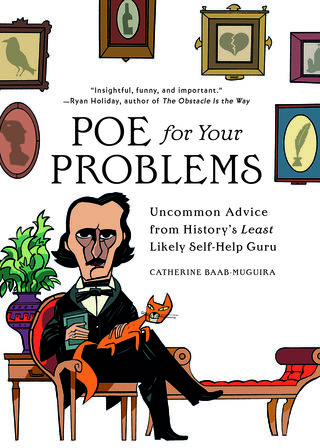Career
How the Work of Poe Inspires Us To Use Our Struggles To Strive
A conversation with Catherine Baab-Muguira.
Posted September 7, 2021 Reviewed by Tyler Woods
Key points
- We can’t understand happiness without sadness. Pain and joy don’t exist without each other, both serve a crucial metaphysical function.
- Understanding the self requires transcending the self and that all the important resolutions we keep come out of moments of profound crisis.
- Poe reminds us that inspiration can come from our worst experiences. That pain, while hard to understand, may have meaning.
Of all the writers anywhere, Edgar Allen Poe might be the least likely person you'd turn to for advice. His life was beyond complicated: he married his cousin, got fired from one job after another, constantly feuded with friends and rivals, and he was always broke. Still, though Poe failed and then failed again better, he also persevered.

I sat down with author Catherine Baab-Muguira, who drew deeply on his works and life to take the familiar image of Poe in a new and surprising direction in her darkly inspiring self-help book, Poe for Your Problems, which aims to teach you how to overcome life’s biggest challenges to succeed at work, love, and art—despite the odds and no matter your flaws.
Lynne Griffin: Though you point out that Poe’s life was “a dumpster fire” of difficulty, you also say that success on his scale doesn’t just happen. It isn’t solely a matter of genius, either. You say it requires vision, fortitude, determination, and even a little bit of narcissism. How exactly does Poe inspire us to use our struggles to strive?
Catherine Baab-Muguira: One of the biggest misconceptions of our time is that intense psychological drive necessarily occurs in pure, healthy form. We worship Silicon Valley founders, and Instagrammers with perfectly curated lives, not assuming from the word go that such people are driven to achieve and/or fan their feathers because they’re acting out of the most monumental hubris—probably compensating for intense mental pain, too. Whereas Poe’s example, because it’s so different, helps us recognize that drive often comes from dark places, and that’s okay. Poe was not an especially functional or well-behaved person but he achieved the most spectacular success anyway. Which means there’s hope for you and me. We can use negative emotions instead of (and in addition to) being used by them.
LG: Your book offers uncommon advice through an anti-self-help lens. Yet it reminds me that there is insight to be found within our darker emotions and motives. How did you come up with the idea to examine what Poe’s life can tell us about the way we frame success in life and work?
CBM: I had the experience of Poe changing my life before I had the idea to write the book. In late 2016, I fell into a deep and terrible depression, and something led me to reread him for the first time since I was a kid. Diving into his work and learning about his endlessly difficult life helped pull me out of that very dark place. And while my book has a humorous title, I’m convinced Poe can help other people going through dark or uncertain times. One thing about Poe is, he never lies to you about how sad life can be. Chances are that he lived through something worse or equally bad as whatever you’re facing. It’s what makes him such a great companion through hell, a kind of low-rent, accessible Virgil, whether you’re a lonely teenager or a struggling, frustrated 50-something.
LG: Poe experienced many traumatic events throughout his life, and still, he harnessed his energy to create art. Can you talk a little bit about artistic expression and writing from heartache? What does the darkness of Poe’s work tell us about his insights related to painful experiences?
CBM: Poe said it better than I can: “All things are either good or bad by comparison…To be happy at any one point we must have suffered at the same. Never to suffer would have been never to have been blessed.” In other words, we can’t understand happiness without sadness. We can’t understand the dull knife of depression or the live-wire tension of anxiety without recalling happier and more peaceful moments of our lives. Pain and joy don’t exist without each other, both serve a crucial metaphysical function. I don’t love that this is true—I wouldn’t suggest you try to love it, either—but I think that Poe is right and that it is true.
LG: Why do you think Poe remains such a polarizing figure today?
CBM: Because Poe wrote for money, he necessarily wrote for a wide audience, and a lot of snotty types sneer at that. Their belief seems to be that, because Poe has managed to entertain and fascinate millions of readers across almost two hundred years, because his work is so successful on so many levels, then he must be an awful writer. How strange is that? Talk about perverse!
LG: You’ve read everything Poe’s written. What three stories or novels do you think are most illustrative of his perspective on life? Which stories might challenge our view of our own?
CBM: “The Imp of the Perverse,” half essay, half short story, is about how we ruin our best chances and betray ourselves, how we’re irresistibly drawn to doing what we know we shouldn’t do. Who can’t relate? The self-awareness and psychological insight it took to write that piece is so admirable.
“Eldorado” is a short poem you can read in about 11 seconds and perfectly encapsulates Poe’s resolve in the face of suffering, aging, and death. I sometimes recall that “ride, boldly ride” line in tricky moments of my own life, like when I’m trying to get off Twitter and do some writing instead, or at the very least, leave the house and go get that pack of paper towels, because we’re out again. Like, c’mon, girl, “ride, boldly ride” to CVS, for goodness sake.
“A Chapter of Suggestions” is an almost New Age essay in which Poe rambles on about the self, philosophy, and personal growth. It’s another short read that can give readers a greater sense of him beyond the better-known murder/bird/death stuff, which we already love. In the essay, Poe says that understanding the self requires transcending the self and that all the important resolutions we keep come out of moments of profound crisis, which is a fascinating truth to meditate upon and recognize in your own life. Why does getting away from ourselves tend to help us understand ourselves better? Why does it usually take a crisis for us to realize anything? And hey, who knew Poe could be so comforting? It reminds us that inspiration can come from our worst experiences. That pain, while hard to understand, may have meaning. That’s not cold comfort. It’s real talk, like where you might land if you and a friend stayed up all night talking and sorting life out. I highly recommend it.
To learn more about Catherine Baab-Muguira’s work, visit her website or see her free newsletter, Poe Can Save Your Life.




